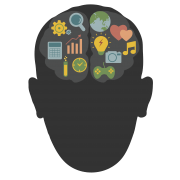Test Your Cognitive Skills to Find Out Your Mental Fitness

You’re probably pleasantly (or painfully) aware of your current physical fitness. But can you gauge the sharpness of your mind? In a world where exercise is king it’s important to whip your brain into shape, too. That starts when you test your cognitive skills so you can judge your baseline brainpower. And it’s trickier than you might think.
Instead of counting push-ups or running speed, you need different means to assess your memory and cognitive skills. Luckily, there are metrics you can measure to see where you’re at. And plenty of resources exist for gathering data on your brain.
Take the first step and familiarize yourself with the mental skills you can measure and tests you can take to establish your baseline brainpower.
Assessing Your Short-Term Memory
Your short-term memory is an easy cognitive skill to test. And quick, too. Short-term memory lasts for about 30 seconds—one minute at the most—and only stores about five to nine items of information. You use this type of memory for a phone number before you dial, or the confirmation code on a plane ticket.
There are dozens of online quizzes and mobile phone apps dedicated to improving your short-term memory. But, first, it’s important to see where you’re starting from so you can track progress.
To appraise your current short-term memory capacity, you can complete tasks that involve recalling a series of numbers or letters from a master list.
Here are two tests you can take right now to see where you’re at:
https://faculty.washington.edu/chudler/stm0.html
https://faculty.washington.edu/chudler/puzmatch.html
Put Your Working Memory to the Test
Knowledge stored in long-term memory and information from your environment combine to create your working memory. Reading, cooking, driving, and mental math all require working memory. These tasks take the rules and skills stored in long-term memory and apply them to solve new problems.
Attention and concentration are also made possible through working memory. Your brain uses working memory to help you focus on work and ignore distractions.
Testing working memory can be fun. Activities like Sudoku and search-and-find games put your brain to work filtering out competing sources of information. They challenge you to focus your attention to complete a task.
Another good assessment of working memory and attention is the Stroop test. You use this type of memory to identify words and colors with variable rules.
Try these working memory tests out for yourself:
https://learn.genetics.utah.edu/content/memory/distraction/
https://learn.genetics.utah.edu/content/memory/types/Stroop-test.pdf
Look at How Your Sensory Memory Stacks Up
A final component of memory you can test involves your senses. Your brain is always receiving sensory information. Scent, sound, taste, touch, and visual data enter the brain and are stored in your sensory memory for a very brief period of time.
When you test this kind of memory, you do it one sense at a time. A common evaluation is called a change blindness test. It plays on your sense of sight and requires your brain to tell the difference between two very similar images.
Take a stab at a sensory memory test with these change blindness demonstrations:
Test Your Cognitive Skills
Cognition may be the most subjective brain metrics. By definition, cognition is the sum of all the processes going on inside your brain. Language, thought, judgment, and memory are all part of cognition.
Your cognitive capabilities are as unique as you are. So, in an effort to create a measurable standard, there are tests available to summarize your cognitive strength. Some cater to specific groups of people (young children, for example), but a few can be applied to anyone looking to gauge their overall cognitive abilities.
- Inductive reasoning tests task your brain to identify patterns and find meaning in large amounts of data. Games that ask you to guess the next in a sequence of numbers, letters, or shapes are examples of this sort of test. The children’s game “one of these things is not like the other” also assesses inductive reasoning skills.
- A situational judgement test is another evaluation of cognition. It’s often administered in questionnaire form, asking you to judge the best or most appropriate response to a given situation. Job applications and interviews often utilize situational judgement testing to narrow down a list of candidates.
- Intelligence tests are a common form of cognitive skills assessment. These are tricky, because many factors influence a person’s intelligence, including education, nutrition, environment, etc. But the Miller Analogies test (MAT) is a reliable version. The MAT uses analogies to evaluate your logical and analytical reasoning.
Check out these online resources to test your cognitive skills:
https://www.shldirect.com/en/assessment-advice/example-questions/inductive-reasoning
https://www.shldirect.com/en/assessment-advice/example-questions/situational-judgement
https://magoosh.com/mat/miller-analogies-test-mat-sample-questions/
Measuring Neuroplasticity
You might be wondering how your brain can keep up with all the information you learn and absorb. Neuroplasticity makes it possible for your brain to grow and change over time. And while it doesn’t literally grow in size, your brain can definitely grow in strength.
The vast networks of neurons in your brain shift and grow as you learn and gain new experiences. Your brain’s ability to adapt and create new neural pathways makes it possible for you to learn a foreign language or pick up a new hobby.
Learning a new skill is the best way to test neuroplasticity. But you can see your brain’s neuroplasticity in action through the power of an fMRI machine that makes neural networks visible.
These machines track the flow of blood in all the regions of your brain. When fMRI scans of the brain are compared over time, it is possible to see new brain pathways develop. This kind of testing is incredibly interesting and expensive, though.
A Word to the Wise About IQ Tests
Odds are you have heard of an IQ test, or even taken one before. IQ stands for intelligence quotient. So, it makes sense that this test aims to quantify your intellectual capabilities and compare them to a general population.
The catch is it’s really difficult to assign a number to anyone’s intelligence. Many factors determine how “smart” you are. IQ tests measure concepts, rather than actual intelligence. They don’t account for the more abstract and individual traits that make a person’s reasoning skills and personality.
They may be interesting, but don’t read too much into IQ tests. They serve a purpose but aren’t the end all be all. Instead, try to use multiple cognitive tests and brain tasks to see where you’re at.
Take Ownership of Your Brainpower
You have a lot of brainpower available to you. Apply some of it to measure your cognitive skills. And use what you’ve read in this review of memory tests and mental tasks to establish your cognitive-skills baseline. Then put your skills to the test or start finding ways to strengthen different aspects of your brainpower.
References
https://www.ncbi.nlm.nih.gov/pmc/articles/PMC3721021/
http://news.mit.edu/2018/mit-scientists-discover-fundamental-rule-of-brain-plasticity-0622
https://learn.genetics.utah.edu/content/memory/types/
https://www.sciencedirect.com/topics/psychology/working-memory-capacity
https://en.wikipedia.org/wiki/Short-term_memory#Measuring_digit_span_and_short_term-memory













